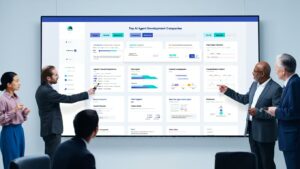78% of organizations reported using AI in at least one business function, up from 55% in 2023, in the latest McKinsey survey.
Today, the question isn’t whether to adopt AI or not.
It is HOW.
Should a business deploy an affordable, off-the-shelf solution, or invest in a custom-built model designed around its unique workflows?
Choosing between off-the-shelf and custom AI solutions is much like choosing between a suit off the rack and one tailored by a designer.
Off-the-shelf tools deliver quick wins but often fall short on scalability or compliance. Custom AI solutions promise a strategic edge but demand careful planning and resources. Business leaders have to choose between the two trade-offs when evaluating AI adoption.
This article offers a side-by-side comparison of off-the-shelf vs custom AI solutions to help leaders make informed decisions. It also discusses where RTS Labs fits in as a consultative partner for long-term AI strategy and execution.
What Is Off-the-Shelf AI?
Off-the-shelf AI is a ready-made solution developed by vendors that can be quickly deployed with minimal customization. These are typically SaaS-based, subscription-driven products designed for mass adoption.
Common examples include:
- AI Chatbots (Intercom, Drift, Zendesk AI) automate customer support and engagement with conversational, always-on service.
- Document Classification Software (Kira Systems, UiPath) extracts and categorizes key information from contracts, forms, or legal documents at scale.
- Predictive Sales/CRM Tools (Salesforce Einstein) forecast sales opportunities and recommend next-best actions for reps.
- Fraud Detection APIs (Feedzai, Sift) analyze transactions in real time to detect and block fraudulent activity.
Advantages of Off-the-Shelf AI
Off-the-shelf AI solutions shine in scenarios where speed, affordability, and ease of deployment are top priorities. A few pros include:
- Accessibility and Affordability: Pre-built AI tools are designed to be plug-and-play. They have lower upfront costs compared to custom development. This makes them accessible even for mid-sized businesses or teams with limited IT resources.
- Faster Deployment: Since these solutions are already developed and tested, organizations can go live in weeks rather than months. These solutions are valuable when speed to market matters, such as rolling out AI-driven chatbots or sales assistants.
- Vendor Support and Regular Updates: Off-the-shelf providers usually handle ongoing maintenance, feature updates, and compliance patches, reducing internal overhead for IT teams.
Limitations of Off-the-Shelf AI
Pre-built solutions’ one-size-fits-all design limits flexibility, often falling short for businesses with unique or evolving needs. A few cons include:
- Generic Design: These tools are built for the average use case. They are not tailored to your unique workflows or competitive edge. For example, an insurer may find the fraud detection model too broad to detect industry-specific fraud signals.
- Scalability Issues: As business needs grow or diversify, pre-packaged AI can hit limits in handling large-scale or highly specialized data. Organizations often outgrow these tools once they require more advanced analytics or predictive models.
- Data Security and Privacy Concerns: Since the vendor controls the infrastructure and model logic, organizations may face compliance challenges, especially in regulated industries like banking, insurance, or healthcare.
- Vendor Lock-In: Switching providers can be costly and time-consuming, leaving businesses dependent on the vendor’s roadmap, features, and pricing model.
Real-World Examples of Off-the-Shelf AI
Off-the-shelf AI is often deployed where speed and accessibility matter more than deep integration. Here are some recognizable examples across regulated industries:
Insurance
Carriers commonly deploy prebuilt fraud detection engines that flag suspicious claims based on anomaly detection. For example, property insurers use vendor models to screen claims for patterns like duplicate photos or recycled policy numbers, catching fraud earlier without needing a full in-house data science team.
Compliance & Legal
Many organizations rely on SaaS-based natural language processing (NLP) platforms for contract review. These tools quickly identify standard clauses, risky terms, or missing language, helping legal teams manage large volumes of contracts more efficiently.
Supply Chain & Logistics
Off-the-shelf demand forecasting tools are popular among mid-sized logistics players. These models use historical order data and seasonality trends to forecast demand spikes. While effective at handling baseline planning, they may struggle with sector-specific disruptions like port congestion or commodity price volatility.
What Is Custom AI?
Custom AI solutions are designed and trained on an organization’s proprietary data, workflows, and goals. Off-the-shelf tools are pre-built but custom AI models are purpose-built to address specific challenges, such as fraud detection in capital markets, predictive maintenance in construction, etc.
Custom solutions allow:
- Tailored algorithms aligned to industry and company data
- Seamless integration into existing systems (ERP, CRM, legacy apps)
- Flexibility to adapt as business evolves
- Full control over data, IP, and security compliance
Though custom solutions can be time-consuming and expensive to build, the long-term ROI and defensibility they bring outweigh the costs incurred.
Advantages of Custom AI Solutions
Custom AI solutions are built around a company’s specific data, workflows, and goals, enabling competitive differentiation and scalability. Here are a few pros:
- Tailored to Business Needs: Custom models are designed around your unique workflows, data sets, and industry context. For example, an insurer can build predictive models specifically for detecting staged accident claims or forecasting natural catastrophe losses.
- Competitive Differentiation: Custom solutions are proprietary and become your intellectual property that competitors cannot replicate. This directly translates into market advantage, such as faster claims resolution in insurance or more accurate demand forecasts in supply chains.
- Scalability and Flexibility: Custom AI can evolve alongside your business. You can extend models to new use cases, add integrations with legacy or cloud systems, and scale up without running into vendor limitations.
- Better Control Over Data Security and Compliance: Organizations retain ownership of their data pipelines and models, a critical factor in regulated industries like banking, insurance, and healthcare, where GDPR, HIPAA, or financial compliance applies.
Limitations of Custom AI Solutions
The trade-off is higher upfront investment and longer deployment timelines, making them less practical for quick wins. A few cons include:
- Higher Upfront Costs: Development, testing, and integration require a larger initial investment compared to off-the-shelf tools.
- Longer Time to Deploy: Depending on complexity, projects may take months to move from concept to production, delaying ROI.
- Need for Expertise: Building and maintaining custom AI requires data scientists, engineers, and domain experts. Many organizations mitigate this by partnering with firms like RTS Labs to handle design, deployment, and ongoing support.
- Ongoing Maintenance Responsibility: Unlike vendor-supported tools, the business must budget for updates, monitoring, and governance to keep models effective and compliant over time.
Real-World Examples of Custom AI
Custom AI shines when industries require tailored solutions that generic tools can’t solve. RTS Labs has worked with clients across insurance, compliance, finance, SaaS, and supply chain to design AI systems that address domain-specific challenges:
Insurance
We helped a mid-sized insurer refine its underwriting and claims workflows by building a predictive model tailored to its policyholder base. Our solution combined telematics, customer history, and external weather data to accurately forecast high-risk claims.
Jennifer Linton, CEO of Fenris Digital, comments about our solution, “RTS Labs has been an invaluable partner in transforming our data and analytics capabilities. Their innovative solutions have streamlined our processes, improved risk assessments, and enhanced efficiency across our operations.”
Regulatory Compliance
For PLG, we developed an AI-powered drafting automaton tool that reduced drafting time by 91%.
We also design AI-driven monitoring frameworks that automatically flag transactions likely to raise red flags under AML (anti–money laundering) regulations. These models incorporate firm-specific thresholds and evolving jurisdictional rules, reducing false positives and audit risks.
Supply Chain
In logistics, solutions are designed as custom route optimization and visibility models that account for unique delivery constraints such as driver schedules, weather patterns, and region-specific tolling.
We assisted a sports equipment manufacturing company suffering from a patchwork data architecture to cut internal costs by automating its marketing strategy, while also reducing company-wide spending by 25%.
Comparison Between Off-the-Shelf vs Custom AI
| Factor | Off-the-Shelf AI | Custom AI Solutions |
|---|---|---|
| Accessibility & Cost | Affordable subscription/licensing fees, minimal IT effort to deploy | Higher upfront investment for development, integration, and scaling |
| Deployment Speed | Fast implementation within weeks, sometimes days | Longer timelines up to months, depending on complexity and integrations |
| Customization | Built for the “average” use case and has limited ability to adapt | Tailored to unique workflows, datasets, and strategic goals |
| Competitive Edge | Provides parity with peers but not differentiation | Proprietary IP creates unique, defensible advantages |
| Scalability | May hit limits as business grows or processes evolve | Designed to grow with the business and expand into new use cases |
| Data Control & Compliance | Vendor controls most of the data pipeline; potential security concerns | Full ownership of data and models critical in regulated industries |
| Support & Maintenance | Vendor handles updates, patches, and support | Ongoing monitoring and updates required, often managed with partners |
The choice between off-the-shelf and custom AI compliance solutions depends on multiple factors. Below, we break down each consideration in detail to help organizations evaluate the right fit.
Cost & Licensing
- Off-the-Shelf: Subscription or SaaS-based pricing (monthly or annual) is relatively affordable. For a tool like a basic legal contract parser or insurance claims classifier, monthly costs might seem low. But as user numbers, volume, or features increase, you’ll often move into higher licensing tiers, meaning costs escalate.
- Custom AI: These require substantial upfront investment for data preparation, model training, integration, etc. However, once built, you avoid many recurring vendor fees. For insurance firms dealing with high volumes of policies or large legal/compliance demands, custom solutions can amortize cost over years and become cost-efficient.
A legal compliance department may use off-the-shelf contract analysis tools, but for a regulatory-heavy domain (e.g., financial compliance), the licensing and vendor constraints may make custom AI more financially sensible in the mid-term.
Deployment Speed
- Off-the-Shelf: These can be deployed quickly, within weeks in many cases. These solutions are ideal for pilot projects in the supply chain (e.g., a demand forecast tool) or simple compliance tasks (like a basic contract review).
- Custom AI: These take more time, often extending up to several months, as custom design has to cover data ingestion, security, compliance, user workflows, training, and feedback loops. But once deployed, adoption tends to be smoother since it matches internal processes better.
In insurance, off-the-shelf claim triage tools can start working quickly, but custom risk assessment or fraud prediction models take longer but deliver greater precision and adoption.
Flexibility
- Off-the-Shelf: The solution often comes with fixed workflows, predefined categories, or labels. It works fine if your business maps well to a “standard” case. But any deviation, such as unusual legal clauses, insurance cases with non-typical risk factors, or a supply chain with idiosyncratic external data, can force workarounds.
- Custom AI: You can define categories, risk thresholds, permissions, and compliance rules specific to your domain. E.g., in legal, you may need to mark clauses differently based on jurisdiction. In insurance, underwriters may want custom risk buckets or thresholds that generic tools don’t offer.
Scalability
- Off-the-Shelf: At a smaller scale, these tools are sufficient to meet needs. But problems emerge when data volume grows, model latency matters, or usage volume skyrockets (more users, more transactions). Licensing tier leaps or performance bottlenecks are common.
- Custom AI: These tools are built to scale from the beginning. Cloud infrastructure, modular pipelines, and the ability to retrain models as data grows. In the supply chain, for instance, when you have dozens of nodes and real-time sensor or IoT input, custom models that scale are essential.
Compliance & Security
- Off-the-Shelf: Generic solutions are often the weak spot for regulated industries. Data may sit on vendor systems outside your control. Auditability, explainability, and compliance can be limited. If you have insurance, banking, or legal obligations, this can expose you to risk.
- Custom AI: Allows data governance with built-in encryption and access control, keeping data in-house or in trusted cloud environments, logging, audit trails, meeting GDPR, HIPAA, or local insurance regulatory requirements.
Maintenance & Upgrades
- Off-the-Shelf: Here, the vendor handles maintenance and updates. You benefit from new features, security patches, etc., but lack control. Sometimes new updates break workflows, or vendor priorities differ from yours.
- Custom AI: Custom solutions give more ownership of maintenance. You manage versioning, feature prioritization, and bug fixes. You decide when to retrain or adjust the model as data drifts. Though more resource-intensive, this gives you control and alignment with your long-term strategy.
Off-the-Shelf vs Custom AI Solutions: Finding the Right Fit for Your Industry
Every industry faces unique constraints. Banking faces regulatory oversight, insurance tackles claims fraud, supply chains suffer from fragmented data, and capital markets have to overcome compliance-heavy workflows.
The decision between off-the-shelf and custom AI can’t be one-size-fits-all. The right choice depends on:
- The magnitude of complexity
- Risk tolerance, and
- Long-term goals.
A few pointers organizations must consider to evaluate these trade-offs and design solutions for quick wins with sustained competitive advantage include:
Banking
Off-the-shelf tools work for front-office efficiency, but regulatory complexity often makes custom or hybrid AI the stronger long-term fit.
- Off-the-Shelf AI: Many banks adopt chatbots for customer support or use ready-made KYC verification tools. These tools reduce call center volumes but often lack depth in risk modeling.
- Custom AI: These solutions enable fraud detection models tuned to the institution’s own transaction data, or compliance engines that account for multi-jurisdiction regulations.
Insurance
For insurers, custom AI unlocks sharper pricing and fraud prevention, while off-the-shelf may serve as a quick complement for customer service.
- Off-the-Shelf AI: Carriers frequently use SaaS platforms for claims triage or policy chatbots. These deliver faster customer response but don’t adapt to unique underwriting logic.
- Custom AI: Enables predictive risk assessment, fraud detection tuned to local markets, and retention models built from proprietary policyholder data.
Supply Chain & Logistics
A hybrid approach is common in supply chain and logistics. Off-the-shelf for baseline forecasting, and custom AIis used for high-value predictive routing and resilience.
- Off-the-Shelf AI: Demand forecasting modules are often bundled into ERP or TMS platforms. They work for standard distribution networks but struggle with volatile, multi-node systems.
- Custom AI: Models can incorporate IoT sensor data, fuel costs, and real-time disruptions to optimize routing and inventory. RTS Labs has helped logistics teams integrate predictive engines into planning tools.
Real Estate
For real estate investors, custom AI offers a sharper competitive advantage when asset performance is highly location-specific.
- Off-the-Shelf AI: Property listing platforms use generic valuation algorithms. These provide ballpark estimates but ignore hyper-local market nuances.
- Custom AI: Investment firms benefit from tailored pricing models that integrate zoning data, energy consumption, or tenant churn risk.
Construction
Custom AI delivers the edge when risk prediction and compliance tracking are central to project success in the construction sector.
- Off-the-Shelf AI: Scheduling and resource optimization plug-ins exist within major BIM software. These tools improve baseline planning but rarely account for on-site realities.
- Custom AI: Predictive safety monitoring, dynamic project risk models, or equipment failure forecasting give project managers actionable foresight.
Wealth Management
Custom or hybrid AI is the way forward for wealth management firms competing on differentiation, not just scale.
- Off-the-Shelf AI: Robo-advisors and portfolio allocation tools provide automated investment strategies at scale. These appeal to retail investors but are commoditized.
- Custom AI: Firms can build models that personalize portfolios based on unique client behavior, regulatory considerations, or ESG mandates.
Capital Markets
In highly competitive markets, custom AI is essential for sustainable alpha and compliance.
- Off-the-Shelf AI: Pre-built trading analytics platforms deliver standardized market signals but are widely accessible, eroding advantages.
- Custom AI: Tailored models allow firms to build proprietary trading signals, assess counterparty risk, and automate compliance reporting.
| Industry | Off-the-Shelf Fit | Custom Fit | RTS Labs Value |
|---|---|---|---|
| Banking | Chatbots, KYC verification, and generic fraud tools | Tailored fraud detection, compliance engines for multi-jurisdiction | Builds regulatory-compliant custom AI models integrated with core banking systems |
| Insurance | Claims triage SaaS, policy chatbots | Predictive underwriting, fraud detection, churn & retention models | Designs predictive risk engines and fraud detection models tuned to insurer data |
| Supply Chain | Demand forecasting in ERP/TMS platforms | IoT-driven routing, dynamic inventory, and disruption risk management | Embeds predictive routing & logistics optimization engines into planning systems |
| Real Estate | Automated property valuations, listing tools | Pricing models using zoning, energy, and tenant churn data | Creates hyper-local asset performance models for investment and pricing strategy |
| Construction | Scheduling plug-ins in BIM software | Predictive safety, equipment failure forecasting, and compliance tracking | Integrates predictive AI into BIM for risk monitoring & project planning |
| Wealth Management | Robo-advisors, standard portfolio allocation | Personalized portfolios, ESG-driven investment optimization | Builds differentiated portfolio models aligned with client behavior & regulations |
| Capital Markets | Generic trading analytics, off-the-shelf signals | Proprietary trading signals, counterparty risk, and automated compliance | Develops custom trading/risk models integrated into capital markets systems |
Hybrid Approach: Combining Off-the-Shelf & Custom AI
For many organizations, the right answer isn’t choosing one model over the other but finding the right balance. A hybrid approach blends the quick wins of off-the-shelf solutions with the strategic depth of custom AI.
For example, a financial services firm may use an off-the-shelf AI chatbot to handle customer FAQs, while investing in a custom-built fraud detection model trained on its proprietary transaction data. In the supply chain, standardized demand-forecasting tools can run alongside custom AI models that account for unique supplier networks or geopolitical disruptions.
The advantage: organizations gain speed and affordability from prebuilt tools while retaining control, flexibility, and competitive differentiation through custom AI.
When to Choose Off-the-Shelf AI Solutions
Off-the-shelf AI works best when:
- Budget is a constraint, and upfront investment needs to be minimized
- Deployment speed matters, such as launching a new service quickly
- Processes are standardized, requiring little customization
- IT resources are limited, making vendor-managed solutions preferable
These solutions are often ideal for smaller organizations or functions where differentiation is less critical.
When to Choose Custom AI Solutions
Custom AI is the stronger choice when:
- Data assets or workflows are unique, and differentiation depends on tailored insights.
- Regulatory compliance is high-stakes, as in healthcare, finance, or insurance.
- Long-term scalability is a priority, and tools must evolve with the business.
- Competitive differentiation is essential, requiring intellectual property and proprietary models.
Here, AI becomes a core strategic asset rather than just an operational enabler. Custom development ensures the solution aligns with business goals and industry-specific challenges.
From Strategy to Execution, RTS Labs Delivers AI That Works
For decision-makers, the question isn’t just whether to buy or build AI. It’s how to ensure those investments create a measurable impact. RTS Labs helps organizations do both, blending prebuilt speed with custom depth for lasting advantage.
RTS Labs bridges the gap between strategy, build, and deployment for enterprises weighing off-the-shelf vs. custom AI. Ready to align AI with your business goals? Contact RTS Labs to build the AI strategy that fits.
FAQs
Q1. How do off-the-shelf AI solutions typically handle data privacy?
They often store or process data on vendor-managed systems, which can raise compliance concerns in regulated industries.
Q2. What is the typical timeline difference between deploying off-the-shelf AI and custom AI?
Off-the-shelf AI can go live in weeks, while custom AI may take months due to design, testing, and integration.
Q3. How do costs compare between off-the-shelf and custom AI over time?
Off-the-shelf AI has lower upfront costs but higher long-term licensing fees; custom AI requires higher initial investment but offers better ROI at scale.
Q4. How does RTS Labs support the choice between off-the-shelf and custom AI solutions?
RTS Labs helps organizations assess business fit, data maturity, and compliance needs before designing custom or hybrid AI strategies.
Q5. What ongoing support does RTS Labs offer after deployment?
We provide model monitoring, retraining, governance, and performance optimization to keep AI solutions effective long-term.






